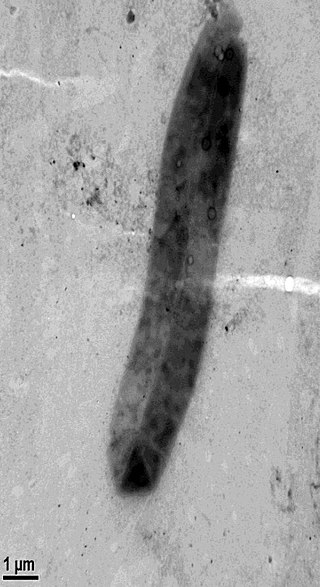Related Research Articles
Parapedobacter is a genus from the family of Sphingobacteriaceae.

Massilia arvi is a Gram-negative, aerobic and non-motile bacterium from the genus Massilia which has been isolated from soil which was cultivated with Brassica oleracea.
Massilia eurypsychrophila is a Gram-negative, aerobic, rod-shaped and facultatively psychrophilic bacterium from the genus Massilia with a polar flagella which has been isolated from the ice core of the Muztagh Glacier in Xinjiang in China.
Massilia norwichensis is a Gram-negative and rod-shaped bacterium from the genus Massilia which has been isolated from air from the Sainsbury Centre for Visual Arts in Norwich in England.
Thermasporomyces composti is a Gram-positive and thermophilic bacterium from the genus Thermasporomyces which has been isolated from compost on Japan.
Clostridium collagenovorans is a bacterium from the genus Clostridium which has been isolated from sewage sludge in the United States.
Candidimonas is a genus of bacteria from the family of Alcaligenaceae.
Candidimonas humi is a Gram-negative bacterium from the genus Candidimonas which has been isolated from sewage sludge in Portugal.
Clostridium homopropionicum is a strictly anaerobic bacterium from the genus Clostridium which has been isolated from sewage sludge in Germany.
Tepidanaerobacter syntrophicus is an anaerobic, moderately thermophilic and syntrophic bacterium from the genus of Tepidanaerobacter which has been isolated from sewage sludge in Niigata in Japan.
Caenispirillum is a bacterial genus from the family of Rhodospirillaceae.
Olsenella umbonata is a variably Gram-positive, anaerobic and non-spore-forming bacterium from the genus of Olsenella which has been isolated from a sheep rumen and a pig jejunum.
Compostibacillus is a Gram-positive, moderately thermophilic rod-shaped, and spore-forming genus of bacteria from the family of Bacillaceae with one known species. Compostibacillus humi has been isolated from sludge compost from Guangdong in China.
Caldicoprobacter faecalis is a bacterium from the genus of Caldicoprobacter which has been isolated from sewage sludge.
Ornithinimicrobium pekingense is a Gram-positive bacterium species from the genus Ornithinimicrobium which has been isolated from activated sludge.
Steroidobacter denitrificans is a Gram-negative and motile bacterium from the genus of Steroidobacter which has been isolated from anoxic sewage sludge from Soers in Germany. Steroidobacter denitrificans has the ability to degrade steroid hormones.
Rhodanobacter is a Gram-negative and non-motile genus of Pseudomonadota.
Rhodanobacter caeni is a Gram-negative and motile bacterium from the genus of Rhodanobacter which has been isolated from sewage sludge from Daejeon in Korea.
Cloacibacillus evryensis is a Gram-negative, anaerobic, mesophilic, rod-shaped and non-motile bacterium from the genus of Cloacibacillus which has been isolated from sewage sludge from a wastewater treatment plant from Evry in France.
Pseudoclavibacter caeni is a Gram-positive, strictly aerobic, rod-shaped and non-motile bacterium from the genus Pseudoclavibacter which has been isolated from sludge from a sewage plant from Daejeon in Korea.
References
- 1 2 Parte, A.C. "Massilia". LPSN .
- ↑ "Massilia umbonata Taxon Passport - StrainInfo". www.straininfo.net.[ dead link ]
- ↑ "Massilia umbonata". www.uniprot.org.
- ↑ Parker, Charles Thomas; Garrity, George M (2014). Parker, Charles Thomas; Garrity, George M (eds.). "Nomenclature Abstract for Massilia umbonata". The NamesforLife Abstracts. doi:10.1601/nm.24980 (inactive 2024-04-17).
{{cite journal}}: CS1 maint: DOI inactive as of April 2024 (link) - ↑ "Details: DSM-26121". www.dsmz.de.
- ↑ Rodriguez-Diaz, M.; Cerrone, F.; Sanchez-Peinado, M.; SantaCruz-Calvo, L.; Pozo, C.; Lopez, J. G. (12 September 2013). "Massilia umbonata sp. nov., able to accumulate poly- -hydroxybutyrate, isolated from a sewage sludge compost-soil microcosm". International Journal of Systematic and Evolutionary Microbiology. 64 (Pt 1): 131–137. doi:10.1099/ijs.0.049874-0. PMID 24030691.